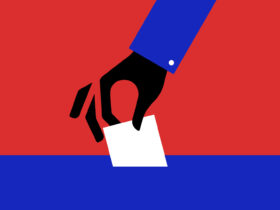On Sunday night, Joe Rogan took to Instagram to apologize for recent public backlash over allegations that his podcast peddles COVID-19 misinformation. In a 10-minute Instagram video, the popular podcast host said that his show, The Joe Rogan Experience, had grown “out of control” and that he would try to cover topics in a more balanced manner.
The apology came after singer Neil Young announced he would remove his music from Spotify because of public health misinformation coming from Rogan’s podcast. On Jan. 24, Young published a letter with an ultimatum to the music streaming platform: regulate Rogan or lose Young’s catalogue.
“I am doing this because Spotify is spreading fake information about vaccines — potentially causing death to those who believe the disinformation being spread by them,” he wrote. “They can have Rogan or Young. Not both.”
Two days after the letter was made public, Spotify announced it was in the process of removing his music. In a later letter, Young said Spotify comprised 60% of his global streaming revenue — a “huge loss” he and his record company were prepared to absorb. Artist Joni Mitchell and longtime E Street Band guitarist Nils Lofgren followed Young in solidarity.
The artists have called on other record companies and musicians to move off of Spotify in an effort to stop supporting the platform’s policies dealing with COVID-19 misinformation.
Spotify, though, is not the only platform caught in the crossfire. Social media giants Meta and Twitter, along with video streaming sites like YouTube, have faced intense scrutiny over its content moderation and regulation policies. Amid rampant misinformation about vaccines and the pandemic, these giants are attempting to thread a careful needle. The controversial debate is not just about regulating misinformation, but also deals with high-stakes topics like freedom of speech, censorship, legal accountability, financial incentives and more.
In the case of Rogan, Young is not the first high-profile individual to accuse the podcast host of recklessly disseminating misinformation about COVID-19. In December 2021, a coalition of 270 medical professionals penned a letter to Spotify, urging the platform to mitigate the spread of misinformation through its services. The letter singled out Rogan for discouraging vaccinations among young people and promoting the use of ivermectin to treat COVID-19. The letter also came only days after Rogan’s podcast featured anti-vaccine darling Dr. Robert Malone in a controversial interview.
Malone is known for promoting false and misleading claims about the pandemic. The former vaccine scientist-turned-skeptic gained thousands of followers online for promoting vaccine falsehoods and drawing comparisons between mass COVID-19 vaccination efforts and Nazi Germany. Days after Twitter banned Malone’s account for violating its misinformation policies, videos of the controversial interview, in which Malone likened vaccines to mass psychosis, were removed from YouTube.
Until Young’s ultimatum to Spotify, which is an exclusive distributor of The Joe Rogan Experience, the streaming platform had been relatively silent on the matter of COVID-19 misinformation. But quick and intense public backlash forced the platform to speak out. According to The Wrap, Spotify lost $2 billion, or 12% of its shares, in the last week.
In response, Chief Executive Daniel Elk made public Spotify’s platform rules and approach to COVID-19. Elk wrote that the platform had been receiving many questions about “the lines [it]ha[s]drawn between what is acceptable and what is not,” and that the platform had, regrettably, not been transparent about its policies.
In Elk’s letter, the Platform Rules were published and the platform announced it would be adding a content advisory notice to any podcast episodes that included a discussion of COVID-19. This advisory directs listeners to a “COVID-19 Hub” with facts and information approved and shared by public health authorities around the world.
Spotify has not, however, removed Rogan’s content at this time — even the episodes that have been singled out for spreading misinformation about COVID-19 and vaccines.
For many years, Rogan has been one of the most influential podcasters in the world. And Rogan’s exclusive deal with Spotify means the platform is not a “neutral distributor” as Spencer Kornhaber of The Atlantic writes. Spotify wrote that its response is an effort to balance the safety of listeners with the freedom of its creators. However, Kornhaber notes that Rogan enjoys more than $100 million from his May 2020 deal with the platform, and will continue to reap those benefits as the podcast continues to publish its episodes, of which there are multiple per week.
According to the platform’s rules, content that is dangerous, deceptive, sensitive or illegal may be removed and its creators could face consequences. However, like most other digital platforms and content giants, what is defined as dangerous, deceptive, sensitive or illegal is at the heart of this debate.
But the Rogan case demonstrates that beyond definitions, it’s not the content that needs labeling, it’s the moderating that needs work.
And many find that Spotify’s actions are far too little, far too late. While Elk’s letter certainly highlights Spotify’s first steps in dealing with COVID-19 misinformation growing pains, content advisories are not seen as regulatory actions — only informative.
Those critical of these actions cite studies that find more information, alone, is a weak weapon against misinformation. Yet, the field of digital communication is flush with new studies and divergent takes. Some experts believe that inundating digital spaces with accurate information helps in the fight against medical misinformation.
Regardless, this celebrity feud-esque flashpoint throws Spotify into the spotlight, and forces the platform to finally reckon with its role and responsibility in the misinformation debate. While the platform’s expansion into the podcast sphere — including exclusive deals made with influential figures like Prince Harry and Megan Markle and Barack and Michelle Obama — has raked in millions in ad revenue and listeners, Spotify is now grappling with its accountability for this content.
Content moderation, regulation and removal is a sticky issue. The platform has already been accused of censorship, though content removal is not an entirely new concept. For example, Spotify removed rapper R. Kelly, who was convicted of several counts of sexual abuse and misconduct, from select playlists and algorithm-based recommendations. In 2019, Rolling Stone reported that Spotify quietly launched a new feature that let users block select artists from automatically playing. Giving listeners the ability to #MuteRKelly placed content moderation in the hands of users — and away from the platform itself.
With Rogan’s podcast, which attracts millions of listeners (11 million per episode, to be exact) and cost millions to exclusively distribute, Young’s proposition was a tough sell. For Spotify, the financial incentives were not there.
Perhaps, though, they will be soon. Spotify faces audio streaming competition from peers Apple Music, Amazon Music, Tidal and more. Young and Mitchell are among the first, but likely will not be the last, legendary artists to encourage their audiences to spend their dollars wisely — on music, not COVID-19 misinformation.
Maybe Spotify should not be so easily spooked — and perhaps, it isn’t. After all, the platform released its statement, unveiled its once-hidden platform policies and created an information hub, but it did not budge on removing Rogan’s podcast episodes.
But Spotify’s awkward positioning on what content it actually moderates is confusing. For example, after Spotify’s decision to remove R. Kelly from certain playlists and stop promoting his music through algorithms received backlash from artists and managers across the world, it swiftly backtracked and abandoned the policy. This decision demonstrates that Spotify is concerned with PR headaches, upsetting artists and labels and responding to backlash.
Additionally, Spotify is worried about over-policing its creators, especially those who wield the most influential and attract the most profit. And this concern is valid. After all, with any sort of speech regulation, many are concerned about an audio platform that leans into heavy-handed regulation. Where would Spotify draw the line?
Yet, Spotify is able to moderate and censor the content on its platform how it pleases. In 2020, far-right conspiracy theorist Alex Jones joined Rogan’s podcast for a lengthy interview. At the time, Elk defended the episode, saying that Spotify “want[s]creators to create” and that the company was “not looking to play a role in what they should say.”
The platform’s arguments that it is a neutral third-party platform ring hollow to many. Spotify says it connects listeners with creators. Facebook and Twitter say they are simply platforms for users to post, engage and discuss. But Rogan is paid by Spotify, and Facebook and Twitter profit off of ad revenue and the popularity from those posts. For many social media platforms, this argument is used to strip platforms of any legal accountability. But lawmakers have recently taken aim at these companies, looking for ways to amend Section 230 and strip the liability shields that protect these platforms from being held accountable for health misinformation.
Beyond questions of legal accountability, many see the Young-Rogan face-off as a crossroads for Spotify. Essentially: would the platform put audio or music first? This time, audio won.
Contrary to its past approach, Spotify will have to become comfortable with this tension. Especially considering its expansion into podcasts, news shows and other media beyond music, Spotify will not be able to escape the ballooning and inevitable debate over content regulation (nor will it be able to escape the deep politicization of regulation debates, whether to regulate liberal or conservative outlets, etc). With an issue like this, it’s nearly impossible to appeal to and appease all sides of the political and cultural spectrum. But a middle path, one characterized by confusing, befuddled policies failing to take concrete aim at any issue, poses an equal concern.
As the infodemic worsens and the fight against misinformation becomes more critical than ever before, Spotify will have to make tough decisions. And these decisions (or non-decisions) will have to come soon, especially as more is revealed about the acutely concerning nature of podcasts — one of the most powerful misinformation machines to have rapidly risen out of the 21st century.







